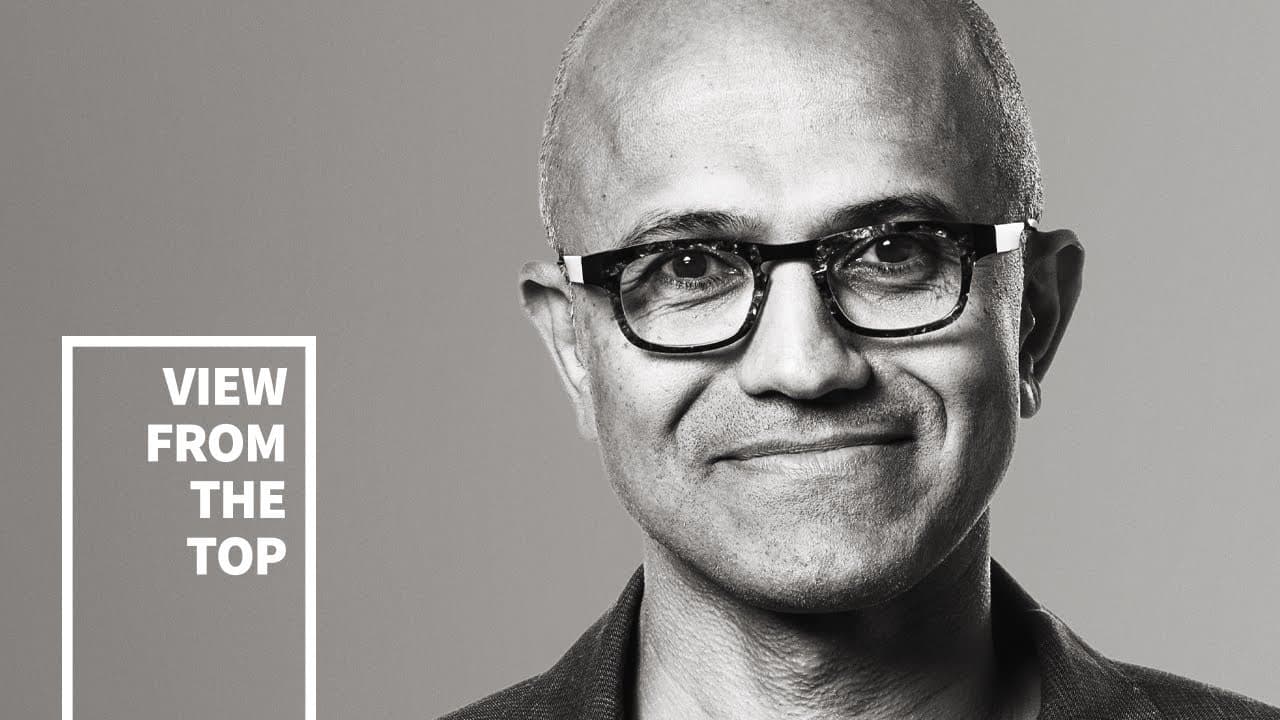Satya Nadella, CEO of Microsoft
17 Nov 2023 (2 years ago)

Intro (0s)
- Microsoft's mission is not to be cool, but to make others cool
- Microsoft is considered cool by many
Childhood in India (34s)
- Satya Nadella's father was a Marxist economist and civil servant, focused on the struggle in life
- Nadella's mother value happiness and asked him if he was happy
- Growing up in Hyderabad in the late 70s and early 80s shaped his ability to think, pursue passions, and have confidence and humility
Lessons from cricket (2m56s)
- Nadella played cricket and believes team sports teach leadership skills
- Learned a leadership lesson when his school captain gave him the ball back after a poor performance, showing the importance of not breaking confidence and making hard calls
Being a parent (5m20s)
- Became a parent in his late 20s, facing complications and his son being diagnosed with cerebral palsy
- Initially struggled with the change in plans for his life, but realized that something had happened to his son and he needed to step up as a father
- Being a parent shaped Nadella's empathy and worldview, teaching him to see the world through his son's eyes and emphasizing the importance of empathy in business
Empathy (9m49s)
- Empathy is important but hard to develop
- Respect is a necessary condition for developing empathy
- Empathy is the source of success in any innovative agenda
Conclusion
- Before becoming CEO, Nadella led Microsoft's first real Cloud business, facing pressure to succeed from Steve Ballmer
- This opportunity was influential and helped Nadella grow and eventually lead the company
Becoming CEO (13m2s)
- Did not anticipate becoming CEO of Microsoft
- Advises not to wait for the next job to do your best work
Cultural shift (18m48s)
- Instilling a growth mindset requires personal change
- Long-term change requires confronting fixed mindsets
- Imperfection and celebrating imperfection is important
- Leadership at the top is vital for implementing change at scale
Lead by example (20m36s)
- Leading by example is necessary for creating a culture of growth mindset
- Example of leading by example is promoting diversity and inclusion within the senior leadership team
Diversity Inclusion (22m50s)
- Emphasizing diversity and inclusion is a cultural priority
- Compensation changes were made to support diversity and inclusion efforts
- Inclusiveness is the real currency of a culture
- First-level managers have significant influence on creating an inclusive environment
- Supporting managers at all levels in fostering inclusiveness is a priority
The Cloud (25m18s)
- The cloud was a risky bet when Satya Nadella took over as CEO of Microsoft.
- Transitioning from the client server era to the cloud was challenging.
- Steve Ballmer, the previous CEO, gave Nadella permission to pursue the cloud strategy.
- Leaders must remove constraints and take on risks in order to make successful transitions.
Culture and Strategy (28m4s)
- Purpose and culture are important pillars for success.
- Strategy and innovation are also crucial, but purpose and culture give the best probability of catching the wave of innovation.
Impact at Scale (29m21s)
- Large organizations like Microsoft have the opportunity to create impact at scale.
- Collaboration and working with others is key to making a difference.
- Recognize the complexity of organizations and bring multiple constituents together to achieve scale.
AI and Humanity (31m48s)
- AI can have positive impacts, such as improving accessibility for those who need help.
- Ethical considerations and the state of AI software engineering are important.
- Humans have the power to shape AI and its consequences.
- Skill people for the jobs of the future and consider new types of skills valued in an AI-driven world.
Who to partner with (35m33s)
- Establish core principles and guidelines for AI use.
- Facial recognition is an example where regulation and guidelines should be in place.
- Collaboration and partnerships should align with these principles and guidelines.
Regulation (36m52s)
- Scrutiny of large organizations is necessary and should be welcomed.
- The technology industry needs to mature quickly and consider the unintended consequences of digital technology.
- Companies need to recognize the opportunities of technology while also taking responsibility for security, privacy, and ethics.
- Positive change is happening, but self-reflection and change are necessary.
Leadership style and values
- Understanding oneself is a lifelong journey
- Understanding others is also important
- Being true to oneself and finding satisfaction in empathizing with others
- Work should have deeper meaning than just being transactional
- Building relationships and mentoring others brings long-term satisfaction
Humility
- Belief in staying humble even during times of celebration
- Grounding oneself and teams amidst success
- Invoking a sense of purpose every day to stay grounded
Decision framework
- Belief in democratic institutions and the democratic process
- Ability to vote and bring about change when needed
- Withholding technology from elected institutions is not helpful
- Ethical principles and reinforcing institutions' history of ethical principles are important
Would you come to the US
- Great opportunities in India, Asia, Africa, and other parts of the world
- Digital technology as a democratizing force
- Learning in the US and returning home is an opportunity, but not the only way to have an impact
- Challenges and opportunities with globalization
Biggest adjustment to your leadership style
- Understanding the unique contributions one can make as a leader
- Recognizing the multi-constituent nature of the CEO role
- Balancing the needs and considerations of customers, partners, employees, investors, and governments